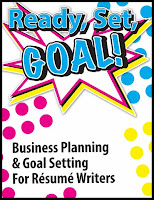In December's special report, "Make Your Resume Business Better," I talk about how to reignite your passion for your resume writing business. One of the ways to do that is to think about how you can introduce innovation and creativity into your daily -- or weekly -- routine.
Smart business owners devote at least a small portion of their working time to innovation and creativity. At big companies like Facebook and Google, employees are allowed to spend a percentage of their time on their own projects. This helps keep their creative fires burning, and some of these projects turn into major successes for their employers.
Here are some ideas to help you put this idea into action.
- Dedicate time for innovation and creation. Just like you mark on your calendar the things you will do today, schedule a block of time devoted to "creation and innovation." You can do an hour a day, or 1/2 a day a week, or some other timeframe that works for you. But it’s important that it’s an actual calendar item and that you know how you’re going to devote that time to creative pursuits. This item on your calendar should be just as important as any other to-do item on your calendar.
- Bring in a creative partner. Sometimes a fresh perspective can open up doors you never before thought were possible to get through. You don’t have to bring in a permanent partner -- you can work on joint ventures with different people on just one project at a time. Start with something small and work your way up to larger ventures. Bringing in a partner will not only spark your creative side, but it will also make you feel challenged -- and maybe a little obligated -- to be a good partner.
- Change your location. One way to open the creative floodgates is to get out of your office. Go to the coffeehouse down the street; go to the park. In the summer, I like to work outdoors on my front porch. (And someday, I'm going to live in Arizona, so I can do that in December too.) Get unplugged and use a paper and pen instead of technology. Turn off the music, turn off the TV, turn off the noise, and get out of your comfort zone. Even a nice walk in the park with a way to record your thoughts can go far in helping you unleash your innovative and creative side.
- Let go of your fears. You might think you’re the only person with fears, but you’re not. Every business owner has expressed fear or felt fear. Even very famous people have had fear about doing something new or different. The only difference between them and you is they felt the fear and did it anyway. You can be just like them by just changing that one thing and just going for it. Just do it. Work through the fear. Channel that fear into motivation to succeed.
- Read industry news. You can use Google Alerts to search for keywords and you'll get an email alert when a story is published. Also join at least one industry association and read the daily e-mail list. Being up to date on what's going on in the resume writing industry can keep you from falling behind. While the resume isn't dead (yet!), that doesn't mean you can bury your head in the sand and pretend you know it all.
- Study your competition. A really good way to get the creative juices flowing is to study what other resume writers are doing. I love looking at resume books — especially the Expert Resume series by Wendy Enelow and Louise Kursmark. You don't want to steal from other resume writers (no plagiarism, please -- even in designs), but it's possible something you see in one of these books will spark your creative energy in a new way outside of anything you’ve ever considered previously.
By taking out time from your busy work schedule to be innovative and creative, you will create a long-term business that will fill your life with passion and profits while never becoming mundane and boring.




















